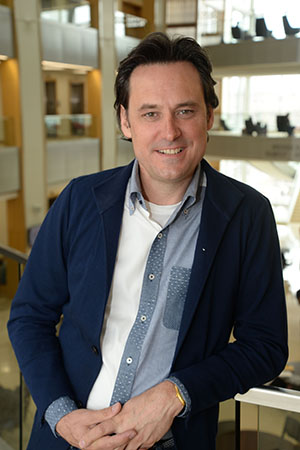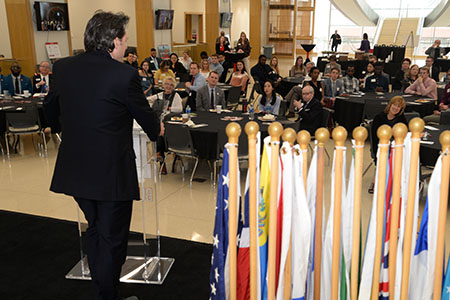Kirk Zeller ’93, grew up on a family farm in Ravenna, Nebraska, during the height of the farm crisis in the ’80s. During long summer days, he would work in the fields listening to the radio about how Japan was taking over the world economically by selling products in the U.S. The stories seemed to encompass something wrong in the world, but they also captured his imagination with visions of a foreign land.
“Nobody could seem to figure out how to sell American products in Japan,” said Zeller. “I kept hearing it in the media over and over again. It inspired me to want to study in Japan. I looked over my options and Nebraska had the best opportunities for studying abroad. My first memory of college was figuring out who I needed to talk to in order to get to Japan.”
He accomplished his first priority by scheduling an appointment with Dr. D’vee Buss, assistant dean for undergraduate programs, to explore the Senshu study abroad program on his first day at the College of Business. Coinciding with his arrival at Nebraska, the college began its first intake of students in a new international business major. Zeller became part of that inaugural class of international business students.
“I participated in both the Senshu University and Nanzan University programs while at Nebraska. I lived with a Japanese host family for two full years taking in the culture and language every day,” he said.
He also studied leading Japanese companies at Senshu, where he came to better appreciate business operations and the Japanese economy. Through it all, he learned what he believes to be the most important factor in finding success abroad – understanding the culture of the country where you want to do business.
 Zeller participated in both the Senshu University and Nanzan University programs while at Nebraska.
Zeller participated in both the Senshu University and Nanzan University programs while at Nebraska.
“One of the big misnomers I had was thinking I’d go to Senshu University and learn how to do business in Japan. What I learned during my time at Senshu and Nanzan is you can’t do business if you don’t understand the culture. That sense that ‘I’ll just do business in Japan’ isn’t correct. In order to effectively do business, you have to understand the culture,” he said.
Zeller returned to Nebraska Business earlier this year to participate in the International Business Summit and talked to students about prioritizing cultural intelligence, which he describes as an analytical framework for how to do business in different countries. He impressed upon students the importance of recognizing cultural differences.
“Whether we’re talking about a distribution deal or an acquisition, the problems that frequently get in the way pertain to cultural insensitivities – that’s where I see most failures happen. To appreciate and have sensitivity to cultural differences is where people succeed. There’s a deep link between understanding cultural attributes that many people can’t appreciate. When I’m working on a deal I have to be sure we’re sending the right person.”
Surrounding his cultural fascination with foreign markets, Zeller also wanted to make a profound impact on people’s lives. He entered the medical device industry as a sales representative in Japan after college, and quickly found his niche making connections facilitating the production of medical technologies that helped save lives.
“One of my most satisfying endeavors was being part of pioneering off-pump bypass where they do bypass surgery without stopping the heart. I got involved with that technology early on when there was only a few people in the company.
It was satisfying to see that technology evolve and see the impact it had on patients. I facilitated dialogue with physicians in Japan to make sure the technology was optimized. In my business upstream marketing is critical working side-by-side with doctors to meet practical clinical needs,” said Zeller.
He went on to acquire advanced degrees from the Imperial College London, where he earned a master’s in biopharma and health technology entrepreneurship, and the International School of Management in Paris, where he earned a doctorate of business administration. He became one of the few people published in his field with his dissertation, “European Market Entry Strategies for Venture Capital Financed Medical Device Companies: Where, When, How and Why.”
 Zeller spoke to attendees of the International Business Summit held at Howard L. Hawks Hall in the spring.
Zeller spoke to attendees of the International Business Summit held at Howard L. Hawks Hall in the spring.
Buss noted Zeller sets an example for current students to follow through his pursuit of bettering himself. She advocated for his appearance as a keynote speaker during the International Business Summit.
“I knew Kirk would be a wonderful ambassador of the Senshu program, a supporting alum of the college and a knowledgeable business person to share expertise and worldwide experience with program participants. He’s never stopped learning and never stopped searching for additional opportunities to apply his passion. His mission has been to not only learn more about a country, its culture and language, but to think broadly about creating business opportunities,” said Buss.
Zeller continues to look for ways to open markets abroad by doing consulting with both domestic businesses looking to expand overseas, and with foreign companies getting setup in the U.S.
“Right now is one of the most exciting times of my career,” he said. “The medical device industry is driving growth in the Japanese economy and I’ve been able to get involved in a lot of startups there who are learning from Silicon Valley. It’s exciting to be giving back through these collaborations.”
Published: July 10, 2018